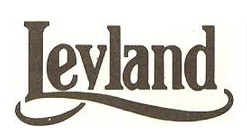
Leyland Motors Limited (later known as the Leyland Motor Corporation) was a British vehicle manufacturer of lorries, buses and trolleybuses.
Founded in 1896 as the Lancashire Steam Motor Company in the town of Leyland in North West England. The company’s first vehicle was a 1.5-ton-capacity steam powered van. This was followed by a number of undertype steam wagons. By 1905 they had also begun to build petrol-engined wagons. The Lancashire Steam Motor Company was renamed Leyland Motors in 1907 when it took over Coulthards of Preston, who had been making steam wagons since 1897. They also built a second factory in the neighbouring town of Chorley.
In 1920, Leyland Motors produced the Leyland Eight luxury touring car, a development of which was driven by J.G. Parry-Thomas at Brooklands. They also produced the Trojan Utility Car in the Kingston upon Thames factory at Ham from 1922 to 1928.
During World War II, Leyland Motors, along with most vehicle manufacturers, was involved in war production. Leyland built the Cromwell tank at its works from 1943 as well as medium/large trucks such as the Hippo and Retriever. After the war, Leyland Motors continued military manufacture with the Centurion tank.
In 1946, Associated Equipment Company (AEC) a British vehicle manufacturer that built buses, motorcoaches and trucks from 1912 until 1979 and Leyland Motors formed British United Traction to build trolleybuses.
In 1955, through an equity agreement, manufacture of commercial vehicles under licence from Leyland Motors commenced in Madras, India at the new Ashok factory. The products were branded as Ashok Leyland.
Leyland Motors acquired other companies in the post war years:
1951: Albion Motors, Scottish automobile and commercial vehicle manufacturer.
1953: Danish Automobile Building (DAB), a bus manufacturer, later with a majority stake in the 1970s
1955: Scammell—military and specialist lorry manufacturer
1961: Standard-Triumph (Standard-Triumph International Limited), cars, vans and agricultural machinery
Holding company: Leyland Motor Corporation
The company diversified into car manufacturing with its acquisitions of Triumph and Rover in 1960 and 1967. Donald Stokes, previously Sales Director, was appointed managing director of Leyland Motors Limited in September 1962. He became chairman in 1966. Chronologically, the 1960s growth of Leyland Motor Corporation (LMC) was as follows:
1962: Leyland Motors acquires Associated Commercial Vehicles (ACV), which incorporated AEC, Thornycroft, Park Royal Vehicles and Charles H Roe.
1962 a new group holding company was incorporated to own Leyland Motors Limited, ACV and new acquisitions
1965: Minority (25%) interests in Bristol Commercial Vehicles and Eastern Coach Works
1966: Rover cars and their subsidiary car, aero-engine and armoured fighting vehicle manufacturer Alvis Car and Engineering Company
1967: Aveling-Barford was acquired. This company mainly made road rollers and dumper trucks.
In 1968 Leyland Motors merged with British Motor Holdings (BMH) to form the British Leyland Motor Corporation (BLMC). BMH, which was the product of an earlier merger between the British Motor Corporation, the Pressed Steel Company and Jaguar, brought with it more marques, including Daimler, Guy, BMC, Austin, and Morris. Leyland diesel engines were used in Finnish Sisu and Vanaja lorries and buses in 1960s.
 British Leyland
British Leyland
British Leyland was an automotive engineering and manufacturing conglomerate formed in the United Kingdom in 1968 as British Leyland Motor Corporation Ltd (BLMC), following the merger of Leyland Motors and British Motor Holdings.
The BLMC group was difficult to manage because of the many companies under its control, often making similar products. This, and other reasons, led to financial difficulties and in December 1974 British Leyland had to receive a guarantee from the British government.
In 1975, after the publication of the Ryder Report and the company’s bankruptcy, BLMC was nationalised as British Leyland (BL) and split into four divisions with the bus and truck production becoming the Leyland Truck & Bus division within the Land Rover Leyland Group. This division was split into Leyland Bus and Leyland Trucks in 1981. Leyland Trucks depended on British sales as well as export markets, mainly Commonwealth and ex-Commonwealth markets. The early 1980s were very hard, with export sales drying up in many places such as oil-dependent Nigeria. In 1986, BL changed its name to Rover Group. The equity stake in Ashok Leyland was controlled by Land Rover Leyland International Holdings, and sold in 1987. At this point, while building about 10,000 trucks per annum, Leyland was more and more depending on outside engines as production of their own 98-series was steadily declining. The 1986 closure of Bedford Vehicles’s heavy truck plant further harmed Leyland, as they had been planning on selling axles and other components to the General Motors subsidiary.
After the various vehicle manufacturing businesses of BL and its successors went defunct or were divested, the following marques survived: Jaguar and Land Rover, now built by Jaguar Land Rover; MG, now built by MG Motor, and Mini, now built by BMW. The truck building operation survived largely intact as Leyland Trucks, a subsidiary of Paccar.

